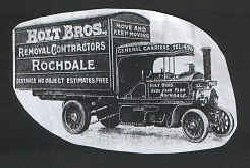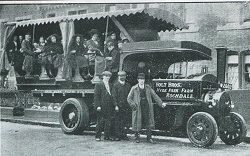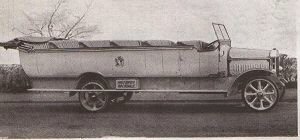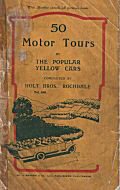|
Messrs
Holt Bros.,
Until
1915,
then
Holt Bros., (Rochdale) Ltd
The Early Years 1902-1932.
~~~~
|
The history of Yelloway Motor Services
can be traced back to around 1902 when
Robert Holt, then aged 21, left his job
with the Lancashire and Yorkshire
railway and commenced a parcels delivery
service in the Rochdale area using a
pony and cart. Robert had secured a
contract to deliver newspapers and
stationary for the firm of Edwards &
Bryning (Printers, Publishers and
Stationers) Ltd., Rochdale. Edwards &
Brynings were later to be the main
supplier of
tickets/brochures/timetables/posters and
stationary for the Yelloway company.
In 1904 Robert Holt went into
partnership with his younger brother
Ernest and they established themselves
as carriers trading as Messrs Holt
Bros.. As the business prospered
additional ponies and carts were
purchased then steam and motor lorries
soon followed.
|

Above.
Holt Bros first Foden
steamer lorry M1857
which was purchased brand
new and arrived at their
Fishwick Street, Rochdale
depot on 8th April 1908.
|
In an attempt
to earn additional revenue, when the
lorries would otherwise be idle,
interchangeable char-a-banc bodies were
made on the premises to enable the
lorries to be converted into passenger
pleasure vehicles for use at weekends.
The first
vehicle to be converted into a
char-a-banc was Holt Bros. second brand
new Foden steam lorry which was used
with a convertible body from 1910.
|


Above left--Holt
Bros. second brand new Foden
steamer M2602 with removals
container arrived 9th May
1910. and
Above right--how
vehicle looked when
converted to char-a-banc at
weekends for trips to the
seaside and local places of
interest. The "Pleasure
Steamer" is seen loaded up
and ready to depart for it's
second trip from outside
Holt Bros depot at Hyde Park
Farm, Milnrow Road, Rochdale
for Hollingworth Lake on
Sunday 31st July 1910. |
The pleasure
steamer actually made it's first trip
two weeks previous but it was notable as
a complete disaster!. The converted
steamer had taken a party of 35 to
Hollingworth Lake, Nr Littleborough,
Lancs and on it's arrival there it was
quite amusing to see the passengers
faces who had been sitting on the first
few rows of seats, they were as black as
coal when they stepped down from the
vehicle. They had been in full line of
fire from the soot and smoke which was
belching from the chimney stack. The
return journey, which was mentioned in a
local newspaper report as "A Thrilling
Experience" was also notable as a
complete washout. On leaving
Hollingworth Lake a torrential downpour
soaked the passengers to the skin, many
of them jumped from the steamer to seek
protection from the heavy rain and in
the rush to get down from the vehicle,
which was still moving, arms and legs
were broken.
The steamer eventually arrived back at
the Holt Bros. Hyde Park Farm depot
Rochdale in the late evening minus the
passengers. those of which hadn't been
injured in the rush to escape the rain
had walked home. The "Pleasure Steamer"
ran each weekend throughout the Spring,
Summer and Autumn months until the
outbreak of World War 1 and up to that
time Messrs Holt Bros. had made a
handsome revenue from people eager to
spend their weekend by the seaside or
other beauty spots. It must also be
noted that many of the "pleasure trips"
included misery when on several
occasions unfortunate passengers, mostly
those who had had too much to drink,
fell from the vehicle whenever it
"clipped" the kerb whilst rounding a
tight corner. There were many
fatalities but it was all taken for
granted with this new form of passenger
travel.
In August 1911 Robert Holt became the
pioneer of long distance motor coach
travel when he set out on the journey
from Rochdale to Torquay in South Devon
in a twenty eight seater purpose built
char-a-banc that he had borrowed from
his friend Mr Arthur Greenoff. Arthur
Greenoff, at that time, was a haulage
contractor in Rochdale and was the first
person in the area to acquire this
'modern' form of transport for trips to
local beauty spots. Robert Holt, at that
time, was contracted to carry goods for
the Rochdale printing and publishing
company of Edwards & Bryning Ltd.
Every year the company's management and
staff went to Torquay for their annual
holiday, which coincided with the famous
Torquay Regatta, but the long awaited
holiday in 1911 was in jeopardy when
British Railways called a national
strike. Robert Holt came to the rescue
with his idea of doing the journey by
road. "We will treat it as an adventure"
he said, and it truly was!. It was the
birth of long distance motor coach
travel from the North West of England.
The journey from Rochdale to Torquay
took two full days but the passengers
thought it 'an exhilarating experience'
especially one young passenger named
Miss Grace Stansfield who was later to
become the worlds highest paid stage and
screen entertainer Gracie Fields.
On the 9th May 1913 the first
purpose built motor char-a-banc,
pictured below, entered service for
Messrs Holt Bros. sporting a yellow
livery and burgundy upholstery. This was
a 28-seat Dennis char-a-banc and when it
arrived at the offices of Holt Bros in
Fishwick Street, Rochdale a member of
staff shouted " The Yellow Car has
arrived"!. This remark was the birth of
the trading name "Holts Yellow Cars". The following year three more purpose
built Dennis char-a-bancs were added to
Holts fleet of vehicles and their first
tour brochure, pictured below, was
published.
The following year three more purpose
built Dennis char-a-bancs were added to
Holts fleet of vehicles and their first
tour brochure, pictured below, was
published.
Halley and Belsize chassis were also
added as the coaching business grew.
Bookings were plentiful and the
Rochdale public were highly delighted
with this exhilarating form of
transport. Holt Bros. posted
advertisements near to railway stations
to tempt rail passengers to try 'Open
Road Touring' instead of
 being
crammed into a stuffy rail carriage.
"Holts Happy Healthy Holidays, avail
yourself of our facilities and take a
restful inspiring holiday, the journey
full of the benefits to be obtained from
nature's own tonic - the fresh air and
health giving sunshine".
being
crammed into a stuffy rail carriage.
"Holts Happy Healthy Holidays, avail
yourself of our facilities and take a
restful inspiring holiday, the journey
full of the benefits to be obtained from
nature's own tonic - the fresh air and
health giving sunshine".
The age of the motor coach had well and
truly arrived in Rochdale and rail
passengers were certainly taking notice
of Holts tempting adverts but alas the
novelty was soon to take a plunge when,
during the main part of the holiday
season, Britain declared war on Germany
and the Dennis char-a-bancs were hastily
commissioned by the government War
Department.
On the 24th
November 1915, the company was
incorporated as
Holt Bros (Rochdale) Ltd..
The onset of World War1 meant that
passenger operations were virtually at a
standstill, although the haulage side of
the business prospered. Following the
end of hostilities, a number of Dennis
chassis were acquired, most of which
carried interchangeable bodies at some
time and were used as either charabanc
or lorry when required. At least one of
these is known to have carried a
double-deck body.
The company extended its operations into
Manchester by opening a depot on Queens
Road, Cheetham, although moves into
Oldham were hampered by the Council's
opinion that a Rochdale company was not
local. As a result licences were not
forthcoming, so a separate company,
Holts of Oldham Ltd, was registered on
22nd April 1919, although in
practice it was operated as a subsidiary
of Holt Bros (Rochdale) Ltd. A depot was
established at the Mumps, where the
Oldham fleet was housed.
Situated amongst the mill towns of the
North West of England, the coaching
business was found to be particularly
seasonal, dependent mainly upon the
annual 'Wakes Week' holidays, which
differed from town to town. Tours and
excursions were limited mainly to summer
Sundays because of the demands of the
mill owners, which required their staff
to work a long six-day week. As a
result, the Company resorted to
'pirating' tactics common amongst
operators of the period. Although
legitimately licensed for operations out
of Oldham, Rochdale and Manchester, the
Company targeted departing passengers
from the surrounding towns by descending
in force at the commencement of the
local Wakes Week hoping to entice
holidaymakers aboard their charabancs.
In addition, local agencies were set up
which helped to fill the coaches with
pre-booked passengers. This sort of
operation was, understandably, not
popular with the legitimate local
operators, but made up a good proportion
of the Company's business in the early
years.
The limitations of 'pirate' tactics were
soon realised by Robert Holt, who
decided to expand into stage carriage
services. In April 1921, he applied for
licences to run a stage carriage service
from Rochdale Town Hall to Wardle, via
Hollingworth Lake. Although refused by
Rochdale Corporation, there is evidence
that a service of sorts was run,
although probably as an excursion, and
it is likely that the double-deck Dennis
vehicle was used. Holt Bros was, by now,
known locally as the 'Yellow Buses'.
At a meeting of Saddleworth UDC in April
1923, Robert Holt applied for licences
to run a stage carriage service between
County End, Lees and Grains Bar
connecting the UDC with Oldham trams.
Saddleworth did not see the necessity of
issuing licences but gave the service
its blessing. The service had commenced
by July 1923, although it was now
operating to Waterhead instead of Grains
Bar as agreed. By the end of 1923 the
following routes would appear to have
been in operation; High Crompton to New
Hey, via Shaw and Ogden; Denshaw to
Mytholmroyd; Waterhead to Denshaw; New
Hey to Denshaw, and Shaw to Delph, some
of the mileage being in the West Riding
of Yorkshire.
The following year, however, the North
Western Road Car Company was granted
licences to operate in competition with
Holt Bros in Saddleworth. Problems with
continued licensing and pressure from
the local councils caused Holt Bros to
cease their service. North Western also
gained licences to run against the
service through High Crompton and this
too ceased, although not until the
spring of 1925, by which time Holt Bros
had withdrawn from stage carriage
services altogether.
By this time, the fleet was beginning to
show signs of wear and tear and with the
loss of the stage carriage services more
reliance was now placed on tours and
excursions from Rochdale. In 1926 the
Company took delivery of its first
'luxury' coaches. Based on the Reo
'Major' chassis, they were bodied by
Lewis & Crabtree of Heywood. Further
Reo's arrived in 1927 and 1928, by which
time the fleetname 'Yelloway Services'
had appeared for the first time.
In the autumn of 1927 premises at Weir
Street, in the centre of Rochdale, were
acquired, which were used as a garage
and departure station. On the 26th
November 1927 an express service between
Rochdale and Manchester was introduced,
in competition with Rochdale and
Manchester Corporations. At the same
time licences for an express service to
Blackpool were sought and a new depot
and terminus on Central Drive was
opened.
On the 1st October 1928 an
ambitious express service linking
Blackpool with London commenced, but the
lightweight Reo's were considered
unsuitable for the arduous schedules and
a number of Tilling-Stevens chassis were
purchased. In later years the London
route was served by a network of
'feeder' coaches enabling connections
with many Lancashire towns.
A new express route to Devon was
introduced on 18th May 1929
to cater for the peak summer holiday
traffic, although it had to be suspended
in October for the winter, even though
attempts were made to continue a weekly
service to Torquay.
In 1930 the Transport Act came into
force, regulating bus and coach
operations for the first time. In order
to be granted licences for the services
each operator was running it was
necessary to provide evidence that the
services were indeed run and that
passengers were carried. It was perhaps
an unfortunate time to introduce such
legislation for an economic slump took
place in the same year, steering a vast
number of operators perilously close to
extinction. Holt Bros purchased the
goodwill of Manchester General Travel
Bookings from Stephen Wade in 1930, who
subsequently re-commenced operations
from a new address in July of the same
year, although the services he operated
seemed to have ceased by August. The
acquisition of the agency brought with
it premises in Mosley Street, Manchester
and from thereon London and Blackpool
bound coaches called here and also at
the Peter Street premises Holt Bros had
opened the previous year. When the
Torquay route re-commenced it too called
here.
Throughout 1930 every effort was made by
the company to attract business, but
financial returns continued to fall
short of expectations. In order to save
costs the placement of nationwide
advertising ceased and the two
Manchester offices were closed. The
creditors involved in hire purchase
arrangements with the coach fleet were
pressing for payment and a Receiver was
appointed. Many of the vehicles were
re-possessed leaving the Company with a
motley assortment of vehicles. On the 28th
November 1930, a meeting proposed that
the Company should be placed into
voluntary liquidation, but the
resolution was not passed and for the
time being the Company soldiered on.
By 1931 there were signs that it may be
possible to purchase the Company back
from the creditors and in March a deal
was struck enabling the creditors to be
paid back and the Company re-purchased.
The shares of Robert Holt and his wife
were acquired by a consortium of Maurice
Edwards (a director of local company
Bromilow & Edwards), John Barlow, an
associate of Edwards, and Herbert
Allen. The new Board immediately set
about putting the company back on its
feet again. The first priority was to
re-purchase as many of the vehicles as
necessary that had been re-possessed,
and accordingly several of these were
back in service by the summer of 1931.
The new owners still faced an uncertain
future as the regulations introduced
under the 1930 Road Traffic Act were
implemented by the Traffic
Commissioners.
On
the 9th April 1932, the
company was officially re-named
Yelloway Motor Services Limited,
starting a new chapter in the company's
history.
Next Page >>